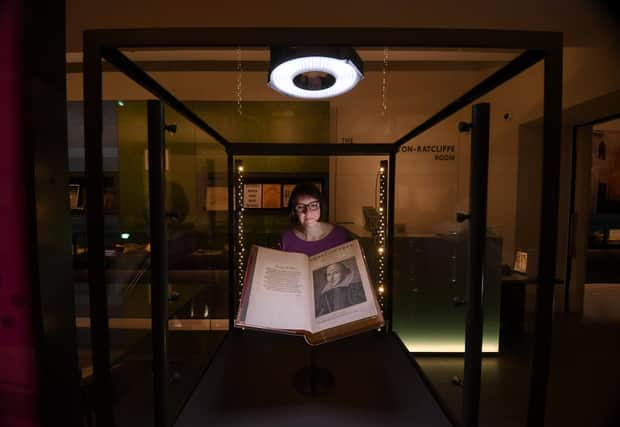From Hamlet to Headingley: Rare copy of Shakespeare's first folio at heart of anniversary celebrations


But Shakespeare’s First Folio – a collection of plays first published in 1823 – could hardly be described as a beggar’s book. With works including Macbeth and The Taming Of The Shrew published for the firs time in the Folio, it is one of the most influential pieces of literature ever published.
Now Shakespeare lovers across Yorkshire have the opportunity to celebrate its 400th anniversary of the Folio’s publication by seeing a rare copy at a Leeds library.
Advertisement
Hide AdAdvertisement
Hide AdThe Brotherton Library’s edition of the First Folio was purchased by Lord Brotherton of Wakefield in 1924 from an American collector, and was left to the University of Leeds, along with the rest of his exceptional library of rare books and manuscripts, on his death in 1930.
As part of the Folio400 project, leading Shakespearean scholar Emma Smith will be returning to her home city of Leeds to give a talk on May 3.
Prof Smith, now a bestselling author and fellow at Shakespeare’s Globe, said: “Some people think this is a book that is all about the past, but I think it’s a book that’s all about the future: preserving these stories so they can be told in different ways by different people at different times.
“There are about 230 copies. It’s a little bit of a paradox – it's not because it’s absolutely rare that it’s so valuable, it’s because it’s so important.
Advertisement
Hide AdAdvertisement
Hide Ad"It’s really exciting to handle the Folio. These are books made of linen paper and some of the copies are quite crisp, whereas others are soft.
"They all have a different binding. Some of them are very fragile – not the Leeds one.
"The thing I love about these books are signs they’ve been used. I absolutely love it when they’re a bit grubby or people have written in them. A lovely copy in Oxford has a ring that looks like a wine glass on one of the pages. I love that sense that this book had a life.”
Prof Smith is also using her trip back to Leeds to reminisce about the city’s place in sparking her love of Shakespeare.
Advertisement
Hide AdAdvertisement
Hide AdThe former Abbey Grange pupil said: “I did go to a couple of productions in the old Playhouse. I can remember going in the late 1970s.
"We did Macbeth at school, Mrs Hadley taught me. That’s a play printed for the first time in this folio.
"I think it’s my favourite of the plays. It’s very dark and concentrated.
"People are always shocked to hear me say I think sometimes Shakespeare is too long, whereas Macbeth is short and focussed."
Advertisement
Hide AdAdvertisement
Hide AdOn one thing Prof Smith is particularly clear – Shakespeare’s relevance to the modern age.
"He’s got a lot to say about populism, fake news, questions about politics and whether we have the leaders that we need.
"He has such interesting things to say about humans: what divides us and what brings us together.”